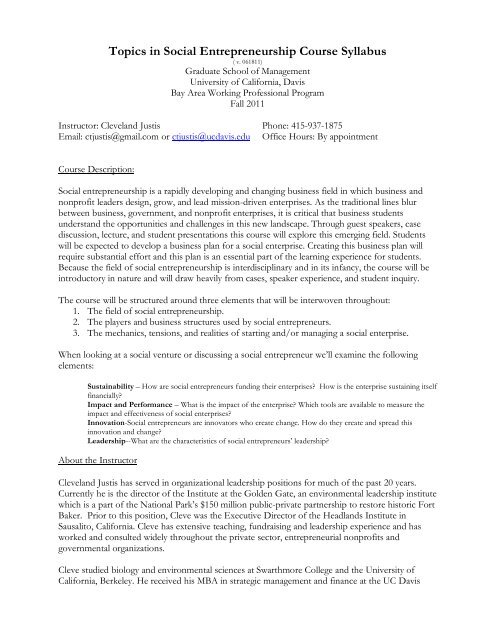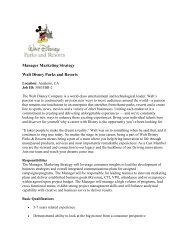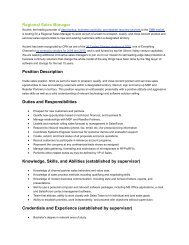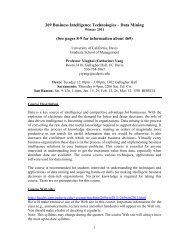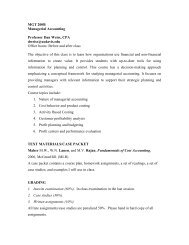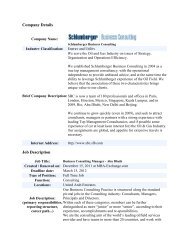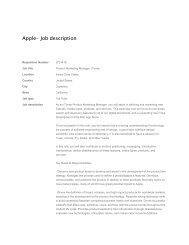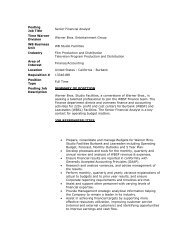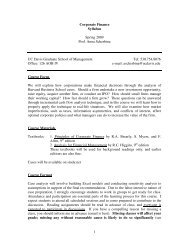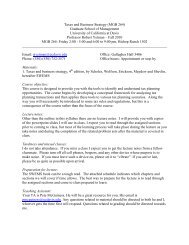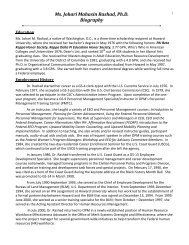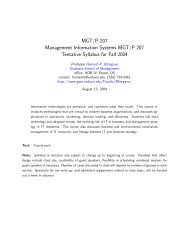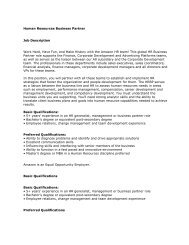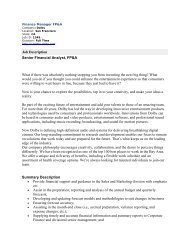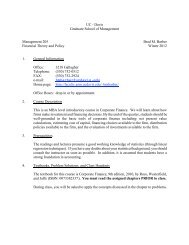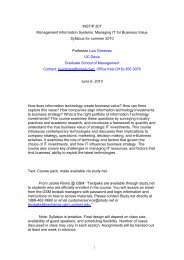Social Entrepreneurship Syllabus 20110618 - Students - UC Davis
Social Entrepreneurship Syllabus 20110618 - Students - UC Davis
Social Entrepreneurship Syllabus 20110618 - Students - UC Davis
You also want an ePaper? Increase the reach of your titles
YUMPU automatically turns print PDFs into web optimized ePapers that Google loves.
Topics in <strong>Social</strong> <strong>Entrepreneurship</strong> Course <strong>Syllabus</strong><br />
( v. 061811)<br />
Graduate School of Management<br />
University of California, <strong>Davis</strong><br />
Bay Area Working Professional Program<br />
Fall 2011<br />
Instructor: Cleveland Justis Phone: 415-937-1875<br />
Email: ctjustis@gmail.com or ctjustis@ucdavis.edu Office Hours: By appointment<br />
Course Description:<br />
<strong>Social</strong> entrepreneurship is a rapidly developing and changing business field in which business and<br />
nonprofit leaders design, grow, and lead mission-driven enterprises. As the traditional lines blur<br />
between business, government, and nonprofit enterprises, it is critical that business students<br />
understand the opportunities and challenges in this new landscape. Through guest speakers, case<br />
discussion, lecture, and student presentations this course will explore this emerging field. <strong>Students</strong><br />
will be expected to develop a business plan for a social enterprise. Creating this business plan will<br />
require substantial effort and this plan is an essential part of the learning experience for students.<br />
Because the field of social entrepreneurship is interdisciplinary and in its infancy, the course will be<br />
introductory in nature and will draw heavily from cases, speaker experience, and student inquiry.<br />
The course will be structured around three elements that will be interwoven throughout:<br />
1. The field of social entrepreneurship.<br />
2. The players and business structures used by social entrepreneurs.<br />
3. The mechanics, tensions, and realities of starting and/or managing a social enterprise.<br />
When looking at a social venture or discussing a social entrepreneur we’ll examine the following<br />
elements:<br />
Sustainability – How are social entrepreneurs funding their enterprises? How is the enterprise sustaining itself<br />
financially?<br />
Impact and Performance – What is the impact of the enterprise? Which tools are available to measure the<br />
impact and effectiveness of social enterprises?<br />
Innovation-<strong>Social</strong> entrepreneurs are innovators who create change. How do they create and spread this<br />
innovation and change?<br />
Leadership--What are the characteristics of social entrepreneurs’ leadership?<br />
About the Instructor<br />
Cleveland Justis has served in organizational leadership positions for much of the past 20 years.<br />
Currently he is the director of the Institute at the Golden Gate, an environmental leadership institute<br />
which is a part of the National Park’s $150 million public-private partnership to restore historic Fort<br />
Baker. Prior to this position, Cleve was the Executive Director of the Headlands Institute in<br />
Sausalito, California. Cleve has extensive teaching, fundraising and leadership experience and has<br />
worked and consulted widely throughout the private sector, entrepreneurial nonprofits and<br />
governmental organizations.<br />
Cleve studied biology and environmental sciences at Swarthmore College and the University of<br />
California, Berkeley. He received his MBA in strategic management and finance at the <strong>UC</strong> <strong>Davis</strong>
Graduate School of Management. While in business school, Cleve served as President of the student<br />
body and received numerous awards including the Dean's Achievement Award and the James<br />
Sullivan Award for outstanding service to the community. Cleve currently serves on several<br />
nonprofit boards of directors (including Net Impact) and advisory councils. Cleve actively teaches,<br />
consults, and speaks on entrepreneurship, fundraising, marketing, and business.<br />
Course Objectives:<br />
At the end of the course, students can expect to:<br />
• Have gained an understanding of the field of social entrepreneurship and understand many<br />
of the opportunities, challenges, and issues facing social entrepreneurs<br />
• Have met leading social entrepreneurs who are using business skills to address complex<br />
social problems.<br />
• Develop a business plan for a social venture<br />
Prerequisites:<br />
There are no formal prerequisites for this class. This course will draw heavily upon the core classes,<br />
and will give students an opportunity to integrate the content from these core classes.<br />
Grading and Class Participation:<br />
There are five items that will comprise your grade. All assignments need to be turned in on-time.<br />
Details on the assignments will be distributed separately:<br />
1. <strong>Social</strong> enterprise summary. Due on the first class. (5% of grade).<br />
2. Conceptual proposal of business plan. Due on the second class (5% of grade).<br />
3. Case presentations and business plan progress reports. Each student team will be responsible<br />
for one group case presentation and a weekly update of progress on business plan<br />
development (15% of grade for case presentation and 15% for progress reports).<br />
4. Business plan and class presentation. Presentations will take place and written plan is due on<br />
the last class (35% of grade).<br />
• Working in groups of two to three people, develop a “business plan” for a new social<br />
enterprise of your design.<br />
5. Class participation (25% of grade).<br />
Attendance, Class Preparation and Class Participation:<br />
This class will rely heavily on the interaction between the students, the instructor, and the guest<br />
speakers. As such, it is critical that you come to all classes well-prepared and ready to contribute.<br />
Assignments are due at each class (including the first one) and you must be fully prepared for each<br />
class in order to be able to participate in class discussion. In addition to the assignments, please<br />
spend time prior to each class session completing web research on the speaker for that evening. It is<br />
expected that you will attend all class sessions. Because of the condensed nature of this program,<br />
missing even one class session may adversely affect your class participation grade.
Required Readings:<br />
1. Course reader. Collection of readings and cases that are listed under individual class sessions.<br />
2. Bornstein, David. How to Change the World: <strong>Social</strong> Entrepreneurs and the Power of New Ideas<br />
(Oxford University Press, 2004).<br />
3. Welch, Wilford. The Tactics of Hope: How <strong>Social</strong> Entrepreneurs are Changing the World. (Earth<br />
Aware, 2008, ISBN 160109014-5).<br />
4. Collins, Jim. Good to Great and the <strong>Social</strong> Sectors: A Monograph, (Harper Collins, 2005, ISBN<br />
097732640).<br />
Recommended Reading:<br />
1. Raising the Bar : Integrity and Passion in Life and Business: The Story of Clif Bar, Inc., By Gary<br />
Erickson.<br />
2. La Piana, David. Play to Win: The Nonprofit Guide to Competitive Strategy. Jossey-Bass,<br />
2005.<br />
Business Plan Resources (not required but very helpful):<br />
• The Business Plan, HBS Class note # 9-389-020<br />
• Some Thoughts on Business Plans, Sahlman.<br />
• How to Write a Great Business Plan, Sahlman.
Detailed Class Schedule:<br />
September 30, 2011: Introduction to <strong>Social</strong> <strong>Entrepreneurship</strong><br />
Reading:<br />
• “The Meaning of <strong>Social</strong> <strong>Entrepreneurship</strong>”, J. Gregory Dees<br />
• “<strong>Social</strong> Capitalists” in Fast Company Magazine, by Cheryl Dahle. The article can be<br />
accessed at:<br />
http://www.fastcompany.com/magazine/102/open_social-capitalists-intro.html<br />
• “<strong>Social</strong> entrepreneurship: What Are We Talking About? A Framework for Future<br />
Research”, Mair and Marti.<br />
• “The New Landscape for Nonprofits”, Ryan.<br />
• “Capitalizing on Convergence”, James E. Austin, Roberto Gutierrez, Enrique<br />
Ogliastri, & Ezequiel Reficco<br />
• “The Citizen Sector: Becoming as Entrepreneurial and Competitive as Business”,<br />
Drayton<br />
• Bornstein, Chapters 1-3, 5-8<br />
Case:<br />
• Newman’s Own<br />
Assignment due:<br />
• 2 page write-up of a social enterprise.<br />
October 14, 2011:<br />
<strong>Social</strong> <strong>Entrepreneurship</strong>, <strong>Social</strong> Enterprise, and Corporations<br />
Reading due:<br />
• “Current Issues in <strong>Social</strong> <strong>Entrepreneurship</strong> Funding and Finance,” Justis.<br />
• “A Roadmap for Natural Capitalism”, Lovins et al<br />
• “The Competitive Advantage of Corporate Philanthropy,” Porter and Kramer.<br />
• “<strong>Social</strong> Enterprise 2.0: Moving toward a sustainable model”, Jim Schorr.<br />
• Bornstein, Chapters 10-12<br />
• Welch, Chapters 1-4<br />
Cases:<br />
• Google.org<br />
• Nature Conservancy<br />
Assignment due: Conceptual proposal of business plan<br />
October 28, 2011: Nonprofits, Governments, and <strong>Social</strong> <strong>Entrepreneurship</strong><br />
(Class meets only 2-5 pm this day.)<br />
Assignment due: Progress report on business plan development.<br />
Reading:<br />
• “<strong>Social</strong> <strong>Entrepreneurship</strong>: The Case for Definition”, By Roger L. Martin & Sally<br />
Osberg<br />
• “Sources of Financing for New Nonprofit Ventures,” Dees & Dolby
• Bornstein, Chapters 16-17<br />
• Welch, Chapters 5-7<br />
November 11, 2011: Competition and Measuring and Managing Performance<br />
For-profit <strong>Social</strong> Venture Models/Marketing<br />
Assignment due: Progress report on business plan development.<br />
Reading:<br />
• “Creating <strong>Social</strong> Change: 10 Innovative Technologies”, John Voelcker.<br />
• “Focusing the <strong>Social</strong> Marketing Concept”, Rangan et al.<br />
• “Should Nonprofits Seek Profits”, Foster and Bradach<br />
• Bornstein, Chapters 13-15, 18-19<br />
Case:<br />
• Patagonia<br />
• Kaiser<br />
December 2, 2011:<br />
Leadership and the Tensions and Challenges of <strong>Social</strong> <strong>Entrepreneurship</strong><br />
Other Important Issues: Partnerships/Change<br />
Assignment due: Progress report on business plan development—focus on pro-forma<br />
financials.<br />
Reading:<br />
• Good to Great and the <strong>Social</strong> Sectors (read entire monograph)<br />
• Bornstein, Chapters 20-21<br />
• Welch, Chapters 8-10<br />
Case:<br />
• New Schools Venture Fund (A)<br />
December 9, 2011: Final presentations and conclusion (in-lieu of a final exam)<br />
(Class meets only 6-9 pm this day, in lieu of a final exam.)<br />
Assignment due:<br />
• Student presentations of business plans<br />
• Written copy of completed business plan


